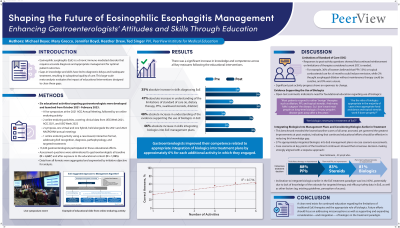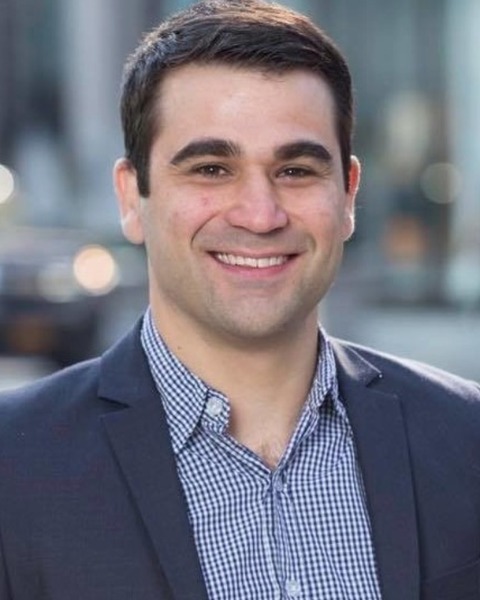Tuesday Poster Session
Category: Esophagus
P3238 - Shaping the Future of Eosinophilic Esophagitis Management: Enhancing Gastroenterologists' Attitudes and Skills Through Education
Tuesday, October 24, 2023
10:30 AM - 4:00 PM PT
Location: Exhibit Hall

Has Audio

Michael Beyer
PVI, PeerView Institute for Medical Education, Inc.
New York, NY
Presenting Author(s)
Michael Beyer, 1, Mary Grecco, 2, Jennifer Boyd, CHCP1, Heather Drew, 3
1PVI, PeerView Institute for Medical Education, Inc., New York, NY; 2PVI, PeerView Institute for Medical Education, New York, NY; 3PeerView Institute, New York, NY
Introduction: Eosinophilic Esophagitis (EoE) is a chronic immune-mediated disorder that requires accurate diagnosis and appropriate management for optimal patient outcomes. Gaps in knowledge and skills have led to diagnostic delays and inadequate treatment, resulting in lesser quality of care. This large-scale meta-analysis evaluates the impact of educational interventions designed to close these gaps.
Methods: The analysis includes data from six (6) educational activities targeted to gastroenterologists and allergist/immunologists. These activities comprised three (3) live symposia, along with their associated enduring activities, and three (3) self-directed online activities. The interventions were implemented over an 18-month period that bridged the timespan before and after the approval of the first targeted therapy for EoE. Total participation by gastroenterologists was significant, with 13,4440 learners across all activities.
Learners were assessed across 4 benchmarks related to skills and understanding of EoE management as well as preparedness for the integration of biologics. Data was aggregated across all activities, with responses from 4,607 gastroenterologist learners collected before participation in the education and 1,995 responses post-activity.
Results: Gastroenterologists showed a significant increase in knowledge and competence following the educational interventions across all key measures.
(table)
Gastroenterologists also improved their competence related to appropriate integration of biologics into treatment plans by approximately 6% for each additional activity in which they engaged.
(image)
Discussion: Gastroenterologists exhibited notable improvements in their attitudes and skills following educational intervention, with gains of over 35 ppt in every benchmark. This indicates their receptiveness to ongoing education and enhanced competence in integrating biologic therapies into EoE treatment plans. As biologics have emerged as a new standard of care in the management of some patients, this improvement can lead directly to improved patient outcomes.
The value of ongoing education is also evident in the analysis demonstrating improvement in baseline competence for each additional activity in which learners engage.

Disclosures:
Michael Beyer, 1, Mary Grecco, 2, Jennifer Boyd, CHCP1, Heather Drew, 3. P3238 - Shaping the Future of Eosinophilic Esophagitis Management: Enhancing Gastroenterologists' Attitudes and Skills Through Education, ACG 2023 Annual Scientific Meeting Abstracts. Vancouver, BC, Canada: American College of Gastroenterology.
1PVI, PeerView Institute for Medical Education, Inc., New York, NY; 2PVI, PeerView Institute for Medical Education, New York, NY; 3PeerView Institute, New York, NY
Introduction: Eosinophilic Esophagitis (EoE) is a chronic immune-mediated disorder that requires accurate diagnosis and appropriate management for optimal patient outcomes. Gaps in knowledge and skills have led to diagnostic delays and inadequate treatment, resulting in lesser quality of care. This large-scale meta-analysis evaluates the impact of educational interventions designed to close these gaps.
Methods: The analysis includes data from six (6) educational activities targeted to gastroenterologists and allergist/immunologists. These activities comprised three (3) live symposia, along with their associated enduring activities, and three (3) self-directed online activities. The interventions were implemented over an 18-month period that bridged the timespan before and after the approval of the first targeted therapy for EoE. Total participation by gastroenterologists was significant, with 13,4440 learners across all activities.
Learners were assessed across 4 benchmarks related to skills and understanding of EoE management as well as preparedness for the integration of biologics. Data was aggregated across all activities, with responses from 4,607 gastroenterologist learners collected before participation in the education and 1,995 responses post-activity.
Results: Gastroenterologists showed a significant increase in knowledge and competence following the educational interventions across all key measures.
(table)
Gastroenterologists also improved their competence related to appropriate integration of biologics into treatment plans by approximately 6% for each additional activity in which they engaged.
(image)
Discussion: Gastroenterologists exhibited notable improvements in their attitudes and skills following educational intervention, with gains of over 35 ppt in every benchmark. This indicates their receptiveness to ongoing education and enhanced competence in integrating biologic therapies into EoE treatment plans. As biologics have emerged as a new standard of care in the management of some patients, this improvement can lead directly to improved patient outcomes.
The value of ongoing education is also evident in the analysis demonstrating improvement in baseline competence for each additional activity in which learners engage.

Figure: Skills Integrating Biologics Improved with Continued Engagement
Disclosures:
Michael Beyer indicated no relevant financial relationships.
Mary Grecco indicated no relevant financial relationships.
Jennifer Boyd indicated no relevant financial relationships.
Heather Drew indicated no relevant financial relationships.
Michael Beyer, 1, Mary Grecco, 2, Jennifer Boyd, CHCP1, Heather Drew, 3. P3238 - Shaping the Future of Eosinophilic Esophagitis Management: Enhancing Gastroenterologists' Attitudes and Skills Through Education, ACG 2023 Annual Scientific Meeting Abstracts. Vancouver, BC, Canada: American College of Gastroenterology.
